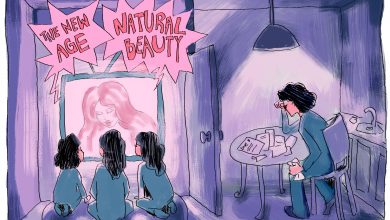Issues with “Daddy Issues”

Illustration by Tina Duong.
We probably have all heard the phrase “daddy issues.” Logically, we would assume that this term refers to a father’s own issues. Contrary to what it suggests though, “daddy issues” instead describes the manifestation of one’s difficult relationship with their father and his personal issues – his failure to communicate, healthily convey emotions, or even be present in his child’s life. This may seem like an apt definition, but is ultimately one that does not fully grasp the negative stereotypes entangled in these types of relationships. If we are to look further, it is evident that in actuality this term wields a hidden and disquieting power.
If you search “daddy issues,” there are countless definitions for the term. According to definitions from Urban Dictionary, a site dedicated to defining slang, daddy issues can refer to anything from “seeking attention,” “being ‘excessively slutty,’” needing “reassurance of love or affection,” being “overly confident” – the list goes on.
While the term “daddy issues” could technically apply to anyone who has had a difficult or painful relationship with their father, the majority of these definitions are used specifically to describe women. This begs us to ask why women are blamed for the failings of their fathers.
Furthermore, the definitions for daddy issues condemn women for things such as: desiring reciprocated relationships (deemed as constantly “needing reassurance of love or affection”), for women having difficulties in creating trusting relationships (typically called “attention whores” or “seeking sympathy”), and/or wanting to express themselves sexually (commonly called “excessively slutty”). In essence, these stereotypes that come with “daddy issues” makes fun of women for wanting healthy relationships and or feeling very real, understandable emotions.
Therefore, we can see that this term reprimands women who have had difficult or painful relationships, those who have emotional difficulties, or essentially any woman who is not a two-dimensional idea of a woman created by men. It completely discourages women’s expression of emotion, and thus discourages women from working with or addressing the issues they may be dealing with in their relationships.
There have always been ways to chastise and police the actions of women and marginalized groups. “Daddy issues,” as a term, is yet another example of this. These terms and the stereotypes that stem from them have real-life effects on the ways people understand themselves in relation to others. They also inform people on ways to navigate social interactions. In short, these terms though seemingly harmless, do affect people negatively and we should be cognizant of the effects of our words, even our slang.
I acknowledge that the phrase “daddy issues” is not one we hear everyday. Despite this, it is crucial to identify and advocate against the ways in which privileged groups influence or shape how marginalized communities are perceived – daddy issues included.




